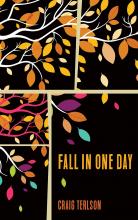Craig Terlson is a real-life Bartholomew Cubbins. That is to say, he wears a startling number of hats. He is an erstwhile illustrator, present-day graphic designer, moonlight master chef, a one-time psychiatric nurse’s aide and a longtime writer of fiction. His debut novel, Fall in One Day, was released on May 16, 2017.
Terlson and his wife lodge their membership at the Grain of Wheat Church-Community in Winnipeg, an ecumenical worshipping body that identifies theological or practical “streams of influence,” including Anglicanism, Catholicism, the Mennonite faith tradition and others.
While Terlson himself does not claim any specific denominational label, both of his daughters graduated from Mennonite schools, and nine-to-fiving for Canadian Mennonite University’s communications and marketing team means that many of his friends and colleagues are Mennonite. As a result, most days of the week he finds himself an outsider on the inside, a margin-dweller straddling many intersecting lines. Nevertheless, as a breaking novelist, it is precisely his comfort with ambiguity and his embrace of tension that makes his work glitter.
Several reviewers have already identified his work as markedly theological, blending questions of faith with the book’s other themes in fresh, provocative ways. In fact, all the mess that Fall in One Day so encompasses, lies sandwiched between two explicitly religious scenes. The first involves a conversation in which Joe is told he is doomed to hell because he was never baptized as a baby, while the last portrays Joe’s “MacGyvered” baptism at the hands of those same two friends, hell bent, as it were, on saving his soul.
One of Terlson’s favourite lines of the book comes from the latter scene, in which Joe asks his friend-turned-self-appointed-cleric: “That white thing, isn’t that what priests wear?” The reply: “This ain’t church. This is more important.”
Terlson, who came to faith is his early 30s, calls episodes like these the natural result of his long-time fascination with the clash between the sacred and profane: “Where do the sacred and profane meet? I say everywhere. Everywhere and all the time.”
Such clashes colour Fall in One Day from front to back, and give its mature content a lift, a truthfulness or resonance to the religious reader’s ear that can be difficult to come by. And truth, Terlson says, is the central concern of the book as a whole: “Who holds the truth? What is the truth?”
Fall in One Day is being marketed as young-adult fiction, a label Terlson appropriately resists. Most of the story is told from the first-person perspective of its central protagonist, 15-year-old Joe Beck. While this makes the novel a naturally sympathetic read for younger audiences, its themes are mature, including drug use, family strife, child abuse, violence, mental illness and even suicide. As a historical novel set in the 1970s, this “sex, drugs and rock ‘n’ roll” book has the politics of Watergate peppered throughout its pages, rubbing alongside the characters’ own discoveries of deceit where there ought to be trust. Furthermore, there are several “main characters” outside of Joe who range in age from 15 to roughly 50, each bringing a different level of complex awareness and life experiences with which the reader must grapple.
Terlson’s book consistently refuses to answer in any concrete way the questions it poses. At best, what the reader can expect is a barely there trail of breadcrumbs to follow, a watermark of wisdom that trickles through from Terlson himself, probably unintentionally. Still, the telling thing about this watermark is that it is left by the waters of baptism—in Joe’s case, the muddy, small-town waters of baptism. Terlson himself notes that, while his title describes one instance or kind of Fall, the novel contains many different and important falls, not the least of which is a pervasive awareness of the biblical Fall of humanity, and the fallen state of things and people:
“We are fallen—and this is what it is—we are fallen,” Terlson says, “but at the same time we are incredibly not just forgiven, but we’re incredibly beautiful.”




Add new comment
Canadian Mennonite invites comments and encourages constructive discussion about our content. Actual full names (first and last) are required. Comments are moderated and may be edited. They will not appear online until approved and will be posted during business hours. Some comments may be reproduced in print.